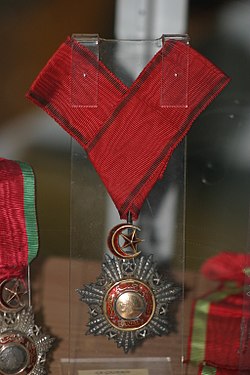Order of the Medjidie
| Order of the Medjidie | |
|---|---|
 Arms of the Order of the Medjidie | |
| Type | Order |
| Country | Ottoman Empire |
| Eligibility | Civilians and military |
| Status | No longer awarded |
| Established | 1851 |
Ribbon bar of the medal | |
Order of the Medjidie (Template:Lang-tr, August 29, 1852 – 1922[1]) is the name of a military and civilian order of the Ottoman Empire.[2] The Order was instituted in 1851 by Sultan Abdulmejid I.[3]
History
Instituted in 1851, the Order was awarded in five classes, with the First Class being the highest. The Order was issued in considerable numbers by Sultan Abdülmecid as a reward for distinguished service to members of the British Army and the Royal Navy and the French Army who came to the aid of the Ottoman Empire during the Crimean War against Russia and to British recipients for later service in Egypt and/or the Sudan. In Britain it was worn after any British gallantry and campaign medals awarded, but, as an Order, before foreign medals like the Turkish Crimean War medal. The Order was usually conferred on officers but a few enlisted soldiers and sailors also received it in a lower class. During World War I it was also awarded to a number of German, Austrian and Bulgarian officers.
The Order was often conferred on non-Turkish nationals.
Design of the Order
On the obverse of the star is Sultan Abdülmecid's royal cipher surrounded by an inscription on a gold-bordered circle of red enamel; all on a star of seven triple quills with small crescents and five-pointed stars between them, suspended from a red enameled crescent and star suspender with green enameled edges.

Rough translation of the front: To the left: (you have) crossed. To the right: (you are proven to be) correct. At the top: (you have provided) protection. At the bottom: Year 1268. In the centre: In the name of the God the forgiver, the merciful.
The order has 5 classes. First, second, third and fourth classes are gold. Fifth (lower) class is silver.
Owners of the order:
- First Class Order (Gold) - 50 people (Given by Sultan)
- Second Class Order (Gold) - 150 people (Given by Sultan)
- Third Class Order (Gold) - 800 people
- Fourth Class Order (Gold) - 3,000 people
- Fifth Class Order (Silver) - 6,000 people
Some notable recipients


- Abdelkader El Djezairi, Algerian Islamic scholar and political and military leader who led a struggle against the French invasion.
- Abraham Ashkenazi, chief rabbi of Palestine
- Mustafa Kemal Atatürk, Ottoman Army officer
- Lucien Baudens, French military surgeon
- Edward Wilmot Blyden, Pan Africanist and Liberian Statesman
- Eugène Chauffeur, French Army officer, from Valence (Drôme), Commandeur of the Legion of Honor, on 6 May 1856. Sous-Lieutenant in the 10th "Bataillon de chasseurs à pied" who sustained a severe wound to the head during the Siege of Sevastopol (Crimea).
- Charles Doughty-Wylie, English army officer who was later killed in the Gallipoli Campaign, ironically in action against Ottoman forces.
- Arthur Conan Doyle, Scottish author
- Richard England, British soldier
- Pierre Louis Charles de Failly, French soldier
- Emanuele Luigi Galizia, Maltese architect and civil engineer
- Rafael de Nogales Méndez, Venezuelan soldier, adventurer and writer.
- George Walter Grabham, British geologist
- George Alfred Henty, English Commissariat Officer and author
- Theodor Herzl, journalist and Zionist leader
- Auguste Lumière, French industrialist and biologist
- Léon-Eugène Méhédin, French architect and photographer
- Helmuth von Moltke the Elder, Prussian Army officer
- Sir William Montgomery-Cuninghame, 9th Baronet, British Army Officer and Victoria Cross recipient
- Napoleon III, Emperor of France
- Major-General Charles George Gordon, Gordon of Khartoum
- Rear-Admiral Maurice Horatio Nelson, son of Thomas Nelson, 2nd Earl Nelson[4]
- Lord Blyth James Blyth, 1st Baron Blyth, British businessman and politician
- General Sir William Parke, British soldier
- Lord George Paulet, British naval officer
- Pedro II of Brazil, Emperor of Brazil
- Ludomił Rayski, Polish pilot
- Cecil Spring Rice, British diplomat
- Haim Palachi, chief rabbi of Izmir
- Jules Ernest Renoux, French painter
- Pierre-Auguste Sarrus, French musician
- Emanuel Stross, Wholesaler[5]
- Charles Carroll Tevis, American soldier of fortune and Anatolian Cavalry leader
- Maréchal Vaillant
- Carol Davila
- Živojin Mišić, Serbian field marshall and Minister of War
- Louis Pasteur, French chemist and microbiologist[6]
- Yosef Navon, Jerusalem businessman and the man principally responsible for the construction of the Jaffa–Jerusalem railway.
- Field Marshal Sir Frederick Paul Haines GCB GCSI CIE
- Charles Pomeroy Stone, career U.S. Army officer, post Civil War soldier of fortune in Ottoman service.
- Dimitrije Cincar-Marković, Serbian Prime Minister and general
- Grocholski Tadeusz
- Valide Perestu Sultan
References
Citations
- ^ Bir Onurlandırma Aracı olarak Osmanlı Nişan ve Madalyaları Archived 2012-05-22 at the Wayback Machine, Osmanlı Bankası Arşiv ve Araştırma Merkezi. (in Turkish)
- ^ Chisholm, Hugh, ed. (1911). . Encyclopædia Britannica. Vol. 18 (11th ed.). Cambridge University Press. p. 69.
- ^ The Americana, Vol.15, Ed. Frederick Converse Beach, George Edwin Rines, (1912);[1]
- ^ "Rear-Admiral Hon. Maurice Horatio Nelson". thepeerage.com. Retrieved 25 May 2018.
- ^ "Österreichisches Biographisches Lexikon". ÖBL 1815-1950, Bd. 13 (Lfg. 62, 2010), S. 424f. Retrieved 11 November 2017.
- ^ "II. Abdülhamid'in Fransız kimyagere yaptığı yardım ortaya çıktı". CNN Türk. Retrieved 29 December 2016.
Bibliography
- The Americana, Vol.15, Ed. Frederick Converse Beach, George Edwin Rines, 1912.
- About Tadeusz Grocholski (in Polish)
